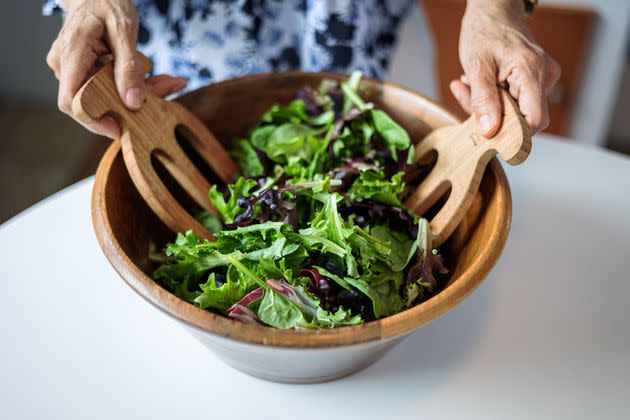The Most Dangerous Foods You Can Bring To A Holiday Potluck

You probably never thought twice about baked potatoes. Now you will.
Invited to a party or gathering for the holidays and need to bring a dish? Before you make your favorite recipe, you’ll want to take precautions to ensure that what you prepare is safe to consume, lest you give someone food poisoning or trigger an allergy.
The last thing you want is someone getting sick from the food you prepared. There are various types of foodborne illnesses, the major ones being norovirus, salmonella (non-typhoidal), clostridium perfringens, campylobacter and staphylococcus aureus, explained Ray Campbell, a health and safety manager at Tulane Dining Services. “People may have a stomachache and they don’t know they have a mild case of food poisoning.”
Anyone can get sick if pathogens are present in the food, especially vulnerable populations, including the elderly, children under 5, pregnant women and those who are immunocompromised. “Those are the ones who are the most likely to become sick enough to be taken to the hospital,” said Dr. Darin Detwiler, a professor of food policy and corporate social responsibility at Northeastern University and author of ”Food Safety: Past, Present, and Predictions.”
Another concern when deciding on what dish to bring for a potluck is to consider food allergens and allergies people may have. “Allergies can cause anaphylactic shock, which can be life-threatening if it’s not treated,” Campbell said.
First, ask yourself these questions before bringing a dish.
Can your dish be properly held at a safe temperature for a long period of time?
“If you are participating in a potluck, there is a basic food safety concept that is essential to prevent making people sick: time and temperature abuse,” said Mitzi Baum, the CEO of STOP Foodborne Illness, a national public health nonprofit advocating for safe food and food safety culture change nationally. “The ‘temperature danger zone’ refers to the temperatures between 40 and 140 degrees Fahrenheit and it is very important to keep foods out of the danger zone.”
Foods that are kept in the temperature danger zone for more than two hours create an ideal environment for bacteria to grow — warmth and food — and proliferate. Even if it seems obvious, all food experts repeated that cold foods need to be kept cold and hot foods need to be kept hot. According to Baum, “That is why at potlucks you need to keep cold foods on ice to maintain a food temperature below 40℉ and hot foods should have a heating element, a chafing dish to keep the food temperature above 140℉ at any type of shared gathering.”
How long will you be traveling with the food?
When it comes to thinking about the temperature danger zone, you also need to consider the time spent making the food as well as time spent traveling to a gathering. “When traveling to the potluck, pack your food with an ice pack and in an insulated bag to keep it cold,” said Olivia Roszkowski, a chef-instructor at theInstitute of Culinary Education.
As stated earlier, food can sit out for two hours at room temperature before it needs to be refrigerated — this also includes considering preparation and travel time. “Be aware of the amount of lag time food goes through when being in the danger zone as a cumulative process,” Roszkowski said, such as, “sitting out at the actual potluck, travel time, amount of time it spent cooling after being prepared, how long the ingredients sat in the refrigerator before being prepared, and amount of time the ingredients spent out of the refrigerator while grocery shopping and getting them home.”
HuffPost spoke with food safety experts on foods they avoid at potlucks, why and tips to ensure no one gets sick.
There are a few specific foods that food safety experts say to avoid.

This one surprise you?
Baked Potatoes In Aluminum Foil
If you like to bake your potatoes in aluminum foil, you’ll want to reconsider your method if you plan to take them to a potluck. When potatoes wrapped in foil cool down, it can create a perfect environment for the bacteria clostridium botulinum to grow because there is a low amount of oxygen. “You’ve created an ideal environment for botulism because now you’ve got the moisture of the steam on the inside, so you have an ideal birthing chamber for bacteria to grow at an alarming rate,” Campbell said. According to StateFoodSafety, you can use aluminum foil to bake your potato — but make sure to remove it from the foil before it reaches the danger temperature zone.
Mayonnaise-Based Salads ... But Not Because Of The Mayo
Potato salad, egg salad and macaroni salad are commonly considered a foodborne risk. If you think mayonnaise is the issue, you’re going to be surprised. According to Baum, “When people get sick from a mayonnaise-based salad, it is instantly determined that the mayonnaise is the culprit, when the culprit is actually the protein or the hydrated or cooked carbohydrate.” Kimberly Baker, a food systems and safety program team director at Clemson University, knows firsthand since she got food poisoning from eating potato salad that sat out too long. “I took one bite and it was warm,” she said. “I didn’t eat any more of it because I knew it was not cold enough, but it only took that one bite to make me very sick!”
Baker recommends when making these types of salads that you keep it cold to reduce any foodborne risks. Make the salad in advance so there is enough time to return the prepared salad to the refrigerator before taking it to the event, she explained, so the salad is at 40 degrees when removed from the refrigerator.
Fish
Campbell avoids bringing any type of fish to a potluck for allergy reasons. Fish or seafood that is steamed can cause food protein particles to be in the air, which can trigger an allergic reaction in some people. “This occurs because the proteins within the food that rise within the steam from the boiling pot. That causes the body to produce a harmful response, such as labored breathing, asthma flareup, etc.,” he said. “The body thinks that it’s actually consuming that type of protein.”
If this were to occur at a potluck, Campbell says having the affected person leave the immediate area will typically be sufficient to mitigate concern.
Leafy Green Salads
The way you prepare and chop ingredients for your salad is key to avoiding cross-contamination. Cutting boards and utensils should be washed to avoid spreading pathogens from one place to another. “Don’t use the same cutting board and utensil to prepare meat and then use them — without replacing or washing them — to cut [ingredients] to make a salad,” said Keith Schneider, a food safety professor in the Department of Food Science and Human Nutrition at the University of Florida.
You also want to consider how someone is mixing the salad, as this can be another way for unwashed hands to cross-contaminate a salad. “Salads that were tossed without the person wearing gloves would be a red flag,” Roszkowski added.
Raw Shellfish
Love sushi and enjoy making it? You may want to wow your friends by preparing a plate to share. If you make sushi with raw fish, instead of fake crab or vegetarian sushi rolls, you’ll need to make sure you have a way to keep it cold. Raw shellfish and oysters are also foods that need to be kept cold to prevent any bacteria from proliferating. “These food items generally need to be kept on ice before preparing them to make them safe to consume, which would be hard to navigate for a potluck,” Roszkowski said.
Schneider also mentioned he would be concerned about rice in homemade sushi not being acidified correctly. Acidified rice can be kept at room temperature if the pH is less than 4.2, according to Clemson University.
Tree Nuts
If a dish calls for sprinkling almonds or peanuts to finish a dish, consider leaving them off or bring them in a separate container. Ask if anyone has food allergens before bringing food or when you arrive, suggested Detwiler. “If you want nuts on it, you can add it, but you can’t take it away,” he said. Campbell wouldn’t bring any baked goods with tree nuts to a potluck to minimize risks for people who may have food allergens.

 Yahoo Sport
Yahoo Sport 





































